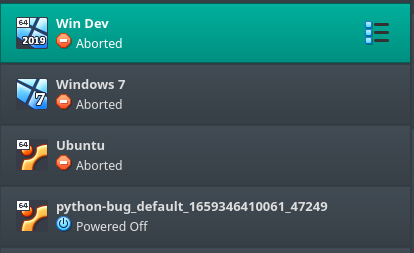I have upgraded the kernel version from 5.10 to 5.15 and it also upgraded the virtualbox kernel modules. The new boxes are working fine (check the last one, I just created for some testing) and old boxes (top 3) are not working, giving an error
The VM session was aborted.
Result Code:
NS_ERROR_FAILURE (0x80004005)
Component:
SessionMachine
Interface:
ISession {c0447716-ff5a-4795-b57a-ecd5fffa18a4}

And here is the inxi output
System:
Kernel: 5.15.55-1-MANJARO arch: x86_64 bits: 64 compiler: gcc v: 12.1.0
parameters: BOOT_IMAGE=/boot/vmlinuz-5.15-x86_64
root=UUID=722ab607-768e-474a-b27b-25c329d85c00 rw
resume=UUID=72408540-0d23-4d2c-9b52-2f0c2af417b9 udev.log_priority=3
Desktop: KDE Plasma v: 5.24.6 tk: Qt v: 5.15.5 wm: kwin_x11 vt: 1
dm: SDDM Distro: Manjaro Linux base: Arch Linux
Machine:
Type: Laptop System: ASUSTeK product: TUF Gaming FX505GT_FX505GT v: 1.0
serial: <superuser required>
Mobo: ASUSTeK model: FX505GT v: 1.0 serial: <superuser required>
UEFI: American Megatrends v: FX505GT.311 date: 02/08/2021
Battery:
ID-1: BAT0 charge: 35.2 Wh (98.3%) condition: 35.8/48.1 Wh (74.4%)
volts: 12.5 min: 11.7 model: Simplo SDI ICR18650 type: Li-ion
serial: <filter> status: N/A cycles: 41
CPU:
Info: model: Intel Core i7-9750H bits: 64 type: MT MCP arch: Coffee Lake
gen: core 9 built: 2018 process: Intel 14nm family: 6 model-id: 0x9E (158)
stepping: 0xA (10) microcode: 0xF0
Topology: cpus: 1x cores: 6 tpc: 2 threads: 12 smt: enabled cache:
L1: 384 KiB desc: d-6x32 KiB; i-6x32 KiB L2: 1.5 MiB desc: 6x256 KiB
L3: 12 MiB desc: 1x12 MiB
Speed (MHz): avg: 800 min/max: 800/2600 scaling: driver: intel_pstate
governor: powersave cores: 1: 800 2: 800 3: 800 4: 800 5: 800 6: 800 7: 800
8: 800 9: 800 10: 800 11: 800 12: 800 bogomips: 62431
Flags: avx avx2 ht lm nx pae sse sse2 sse3 sse4_1 sse4_2 ssse3 vmx
Vulnerabilities:
Type: itlb_multihit status: KVM: Split huge pages
Type: l1tf
mitigation: PTE Inversion; VMX: conditional cache flushes, SMT vulnerable
Type: mds mitigation: Clear CPU buffers; SMT vulnerable
Type: meltdown mitigation: PTI
Type: mmio_stale_data mitigation: Clear CPU buffers; SMT vulnerable
Type: spec_store_bypass
mitigation: Speculative Store Bypass disabled via prctl and seccomp
Type: spectre_v1
mitigation: usercopy/swapgs barriers and __user pointer sanitization
Type: spectre_v2 mitigation: Retpolines, IBPB: conditional, IBRS_FW,
STIBP: conditional, RSB filling
Type: srbds mitigation: Microcode
Type: tsx_async_abort status: Not affected
Graphics:
Device-1: Intel CoffeeLake-H GT2 [UHD Graphics 630] vendor: ASUSTeK
driver: i915 v: kernel arch: Gen9.5 process: Intel 14nm built: 2016-20
ports: active: eDP-1 empty: none bus-ID: 00:02.0 chip-ID: 8086:3e9b
class-ID: 0300
Device-2: NVIDIA TU117M [GeForce GTX 1650 Mobile / Max-Q] vendor: ASUSTeK
driver: nvidia v: 515.57 alternate: nouveau,nvidia_drm non-free: 515.xx+
status: current (as of 2022-06) arch: Turing process: TSMC 12nm
built: 2018-22 pcie: gen: 1 speed: 2.5 GT/s lanes: 16 link-max: gen: 3
speed: 8 GT/s bus-ID: 01:00.0 chip-ID: 10de:1f91 class-ID: 0300
Device-3: IMC Networks USB2.0 HD UVC WebCam type: USB driver: uvcvideo
bus-ID: 1-11:2 chip-ID: 13d3:56a2 class-ID: 0e02 serial: <filter>
Display: x11 server: X.Org v: 21.1.4 compositor: kwin_x11 driver: X:
loaded: modesetting,nvidia alternate: fbdev,nouveau,nv,vesa gpu: i915
display-ID: :0 screens: 1
Screen-1: 0 s-res: 1920x1080 s-dpi: 96 s-size: 508x285mm (20.00x11.22")
s-diag: 582mm (22.93")
Monitor-1: eDP-1 model: Najing CEC Panda 0x0036 built: 2018
res: 1920x1080 hz: 120 dpi: 142 gamma: 1.2 size: 344x194mm (13.54x7.64")
diag: 395mm (15.5") ratio: 16:9 modes: 1920x1080
OpenGL: renderer: Mesa Intel UHD Graphics 630 (CFL GT2)
v: 4.6 Mesa 22.1.3 direct render: Yes
Audio:
Device-1: Intel Cannon Lake PCH cAVS vendor: ASUSTeK
driver: sof-audio-pci-intel-cnl
alternate: snd_hda_intel,snd_soc_skl,snd_sof_pci_intel_cnl
bus-ID: 00:1f.3 chip-ID: 8086:a348 class-ID: 0403
Device-2: NVIDIA vendor: ASUSTeK driver: snd_hda_intel v: kernel pcie:
gen: 1 speed: 2.5 GT/s lanes: 16 link-max: gen: 3 speed: 8 GT/s
bus-ID: 01:00.1 chip-ID: 10de:10fa class-ID: 0403
Sound Server-1: ALSA v: k5.15.55-1-MANJARO running: yes
Sound Server-2: JACK v: 1.9.21 running: no
Sound Server-3: PulseAudio v: 16.1 running: yes
Sound Server-4: PipeWire v: 0.3.56 running: yes
Network:
Device-1: Intel Cannon Lake PCH CNVi WiFi driver: iwlwifi v: kernel
bus-ID: 00:14.3 chip-ID: 8086:a370 class-ID: 0280
IF: wlo1 state: up mac: <filter>
Device-2: Realtek RTL8111/8168/8411 PCI Express Gigabit Ethernet
vendor: ASUSTeK driver: r8169 v: kernel pcie: gen: 1 speed: 2.5 GT/s
lanes: 1 port: 3000 bus-ID: 03:00.0 chip-ID: 10ec:8168 class-ID: 0200
IF: enp3s0 state: down mac: <filter>
IF-ID-1: br-1eccf73e6106 state: down mac: <filter>
IF-ID-2: br-a0596a8d9fbb state: down mac: <filter>
IF-ID-3: docker0 state: down mac: <filter>
IF-ID-4: vboxnet0 state: up speed: 10 Mbps duplex: full mac: <filter>
Bluetooth:
Device-1: Intel Bluetooth 9460/9560 Jefferson Peak (JfP) type: USB
driver: btusb v: 0.8 bus-ID: 1-14:3 chip-ID: 8087:0aaa class-ID: e001
Report: rfkill ID: hci0 rfk-id: 0 state: up address: see --recommends
Drives:
Local Storage: total: 1.38 TiB used: 371.95 GiB (26.4%)
SMART Message: Unable to run smartctl. Root privileges required.
ID-1: /dev/nvme0n1 maj-min: 259:0 vendor: Micron
model: 2200V MTFDHBA512TCK size: 476.94 GiB block-size: physical: 512 B
logical: 512 B speed: 31.6 Gb/s lanes: 4 type: SSD serial: <filter>
rev: P1MA0V4 temp: 38.9 C scheme: GPT
ID-2: /dev/sda maj-min: 8:0 vendor: Western Digital
model: WD10SPZX-11Z10T0 size: 931.51 GiB block-size: physical: 4096 B
logical: 512 B speed: 6.0 Gb/s type: HDD rpm: 5400 serial: <filter>
rev: 1A01 scheme: GPT
Partition:
ID-1: / raw-size: 117.19 GiB size: 114.79 GiB (97.95%)
used: 28.94 GiB (25.2%) fs: ext4 dev: /dev/nvme0n1p2 maj-min: 259:2
ID-2: /boot/efi raw-size: 200 MiB size: 196.9 MiB (98.45%)
used: 274 KiB (0.1%) fs: vfat dev: /dev/nvme0n1p1 maj-min: 259:1
ID-3: /home raw-size: 343.05 GiB size: 336.6 GiB (98.12%)
used: 154.65 GiB (45.9%) fs: ext4 dev: /dev/nvme0n1p3 maj-min: 259:3
Swap:
Kernel: swappiness: 60 (default) cache-pressure: 100 (default)
ID-1: swap-1 type: partition size: 16.5 GiB used: 48.2 MiB (0.3%)
priority: -2 dev: /dev/nvme0n1p4 maj-min: 259:4
Sensors:
System Temperatures: cpu: 45.0 C pch: 50.0 C mobo: N/A
Fan Speeds (RPM): cpu: 2400
Info:
Processes: 348 Uptime: 1d 4h 17m wakeups: 8 Memory: 15.48 GiB
used: 5.96 GiB (38.5%) Init: systemd v: 251 default: graphical
tool: systemctl Compilers: gcc: 12.1.0 clang: 14.0.6 Packages: pacman: 1326
lib: 332 Shell: Bash v: 5.1.16 running-in: konsole inxi: 3.3.19